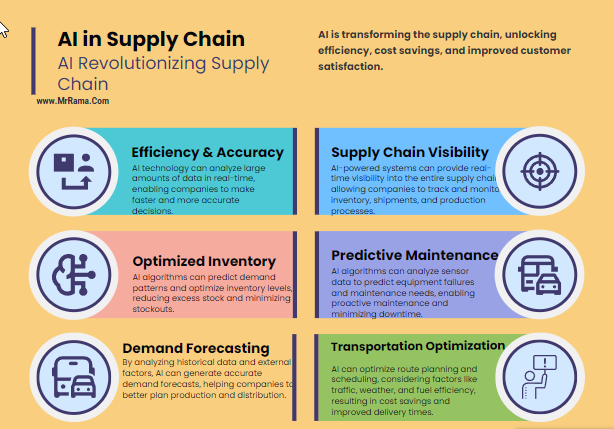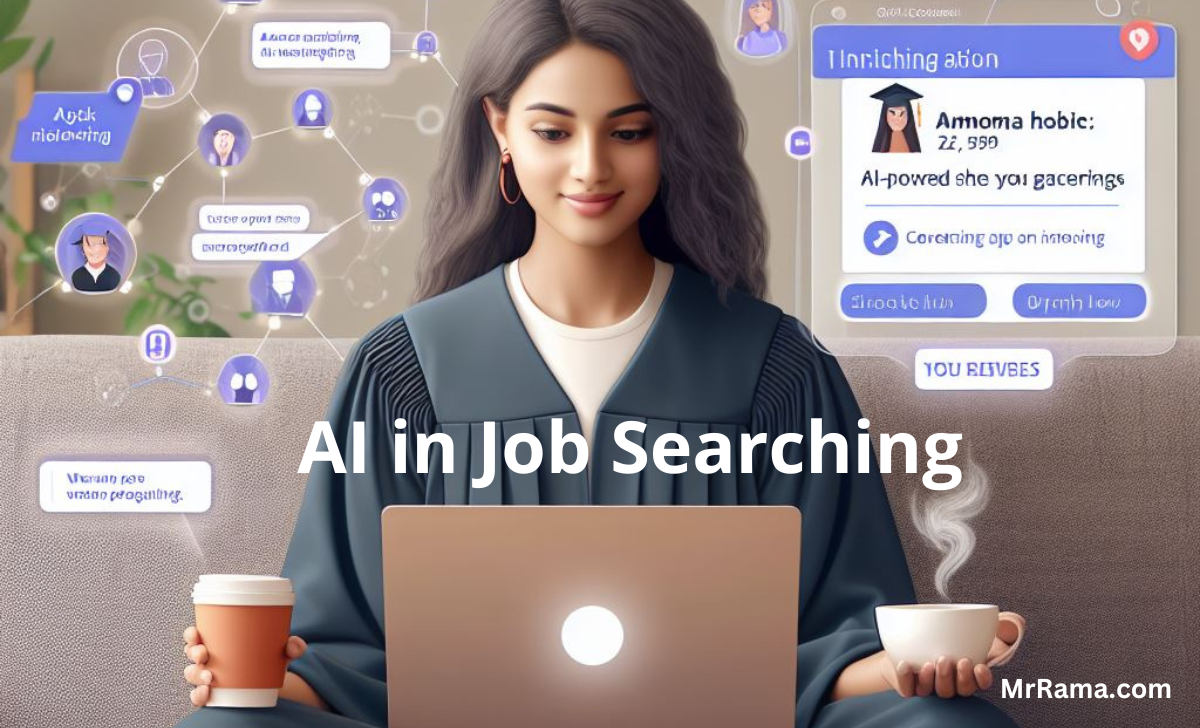|
Listen Now Our Blog Podcast
Getting your Trinity Audio player ready...
|
AI in Supply Chain Management(SCM)
The global supply chain, once a complex and often opaque network, is undergoing a dramatic transformation. No longer are shipments left to the whims of weather and manual processes.
Artificial intelligence (AI) is emerging as the invisible hand of efficiency, optimizing every step from procurement to delivery, propelling businesses towards a future of streamlined logistics and delighted customers.
Beyond Automation: AI’s Strategic Role in Supply Chains
Gone are the days of AI being viewed solely as a tool for automating repetitive tasks. While it excels in streamlining order fulfillment and warehousing operations, its true potential lies in strategic decision-making and proactive problem-solving.
Here are some key areas where AI is reshaping the supply chain landscape.

1. Demand Forecasting with Uncanny Accuracy:
Gone are the days of relying on historical data and gut feeling to predict product demand.
AI, armed with machine learning algorithms, analyzes vast datasets encompassing market trends, social media buzz, and even weather patterns to generate hyper-accurate forecasts.
This empowers businesses to optimize inventory levels, preventing costly overstocking or stockouts.
2. Predictive Maintenance for Uninterrupted Operations:
Imagine never having to worry about equipment breakdowns bringing your entire operation to a standstill.
AI-powered predictive maintenance analyzes sensor data from machinery and vehicles in real time, identifying potential failures before they occur.
This allows for proactive maintenance scheduling, maximizing uptime, and minimizing downtime costs.
3. Dynamic Route Optimization for Agile Deliveries:
Gone are the days of rigid delivery schedules that fail to adapt to real-time traffic conditions and unforeseen delays.
AI-powered route optimization platforms analyze live traffic data, weather updates, and even driver behavior to generate the most efficient delivery routes in real time.
This results in faster deliveries, reduced fuel consumption, and improved customer satisfaction.
4. Blockchain-Powered Transparency and Trust:
In today’s world, traceability and transparency are paramount in building consumer trust.
AI, coupled with blockchain technology, creates a secure and tamper-proof digital ledger of every step a product takes in the supply chain.
This level of transparency empowers businesses to demonstrate ethical sourcing practices and build stronger relationships with customers and stakeholders.
5. The Rise of “Smart Warehouses” for Seamless Inventory Management:
Manual inventory management is becoming a relic of the past.
AI-powered robots equipped with computer vision navigate warehouses, identify and track inventory in real time, and even fulfill orders autonomously.
This not only increases accuracy and efficiency but also frees up human workers for more strategic tasks.
6. Hyper-Personalization for Customer-Centric Deliveries:
AI doesn’t just optimize internal operations; it can also personalize the customer experience.
By analyzing purchase history and preferences, AI can predict what customers want and when they want it.
This allows businesses to offer dynamic delivery options, tailored communication, and even customized packaging, creating a truly customer-centric supply chain.
7. Sustainability at the Forefront: AI for Eco-Friendly Logistics:
Environmental responsibility is no longer an afterthought in supply chain management.
AI algorithms are being used to optimize transportation routes, reducing fuel consumption and emissions.
AI can identify opportunities for green packaging and sustainable sourcing practices, minimizing the environmental impact on the entire supply chain.
8. The Human-AI Collaboration: Towards a Hybrid Future:
Despite AI’s transformative power, it’s crucial to remember that it’s a tool, not a replacement for human expertise.
The future of supply chain management lies in a harmonious collaboration between human intelligence and AI’s analytical capabilities.
This hybrid approach leverages the best of both worlds, allowing humans to focus on strategic decision-making and problem-solving, while AI handles the data crunching and optimization tasks.
AI is not just revolutionizing the supply chain; it’s paving the way for a more resilient, efficient, and customer-centric future.
As businesses embrace this transformative technology, they unlock a world of possibilities, not just for cost savings and operational excellence, but also for building stronger relationships with customers and stakeholders.
Impact of AI in the SCM Sector
| Area of Impact | Traditional Approach | AI-Powered Approach | Benefits |
|---|---|---|---|
| Demand Forecasting | Historical data, gut feeling | Machine learning algorithms analyze vast datasets | Hyper-accurate forecasts, optimized inventory levels |
| Predictive Maintenance | Reactive maintenance schedules | Sensor data analysis, real-time failure prediction | Proactive maintenance, maximized uptime, minimized downtime costs |
| Route Optimization | Rigid delivery schedules | Live traffic data analysis, real-time route generation | Faster deliveries, reduced fuel consumption, improved customer satisfaction |
| Transparency and Trust | Paper-based records, manual verification | Blockchain-powered digital ledger | Secured and transparent supply chain, increased customer trust |
| Warehouse Management | Manual inventory tracking, human picking | AI-powered robots, real-time inventory management | A hybrid approach combining human expertise and AI analysis |
| Customer-Centric Deliveries | Generic delivery options, mass communication | Customer preference analysis, personalized delivery experiences | Dynamic delivery options, tailored communication, enhanced customer satisfaction |
| Sustainability | Inefficient routes, traditional packaging | Optimized transportation routes, green packaging selection | Reduced emissions, minimized environmental impact |
| Human-AI Collaboration | Humans handle all tasks | Strategic decision-making by humans, data crunching, and optimization by AI | Strategic decision-making by humans, data crunching and optimization by AI |
This blog post has only scratched the surface of AI’s impact on supply chain management. As the technology continues to evolve, we can expect even more innovative applications to emerge, further blurring the lines between the physical and digital realms and propelling us towards a truly intelligent and interconnected supply chain ecosystem.




